Pectoral. Greece, 4th century BC. Bronze.
Pectoral. Greece, 4th century BC.
Bronze.
Measures: 18 x 18 x 3 cm.
Pectoral belonging to a Greek hoplite's armour, dated to the 4th century BC, made entirely of gilded bronze. This example still retains the rings and straps that held it to the soldier's body. With Greek territorial expansion, many peasants gained access to new agricultural land and saw their incomes increase. With this income they were able to afford military equipment that enabled them to go to war, fighting side by side with the aristocrats. The figure of the hoplite soldier was born, linked to a specific type of combat: the close formation. This type of battle formation had a direct impact on the socio-political organisation of the Greek polis. The hoplite peasants and merchants realised that the ideals of solidarity and comradeship on the battlefield did not translate into real equality of rights in the city. The aristocrats continued to hold power and administer justice arbitrarily. Therefore, they began to demand greater participation in the public life of the city in order to become part of the community. This demand was the seed of the later emergence of democracy.
Estimate
Time, Location
Auction House
Pectoral. Greece, 4th century BC.
Bronze.
Measures: 18 x 18 x 3 cm.
Pectoral belonging to a Greek hoplite's armour, dated to the 4th century BC, made entirely of gilded bronze. This example still retains the rings and straps that held it to the soldier's body. With Greek territorial expansion, many peasants gained access to new agricultural land and saw their incomes increase. With this income they were able to afford military equipment that enabled them to go to war, fighting side by side with the aristocrats. The figure of the hoplite soldier was born, linked to a specific type of combat: the close formation. This type of battle formation had a direct impact on the socio-political organisation of the Greek polis. The hoplite peasants and merchants realised that the ideals of solidarity and comradeship on the battlefield did not translate into real equality of rights in the city. The aristocrats continued to hold power and administer justice arbitrarily. Therefore, they began to demand greater participation in the public life of the city in order to become part of the community. This demand was the seed of the later emergence of democracy.



